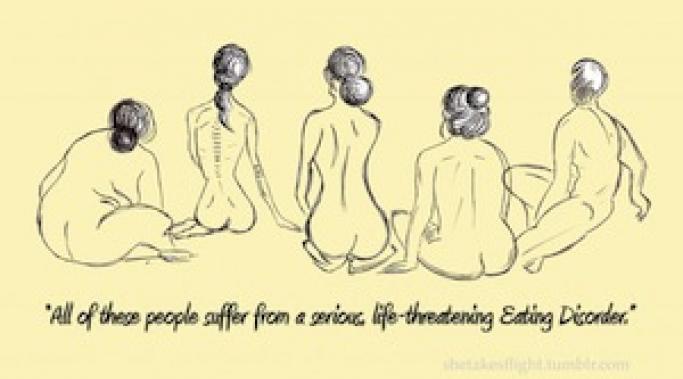Patricia and I have both written before about the long, slow process of coming to acceptance of your body in your eating disorder recovery. However, it occurred to me that one of the most helpful things in my early recovery from anorexia, was a list of very down-to-earth, very practical do's and don't's for dealing with my changing body. Some of these are things I still use today if I'm having a rough body image day.
Surviving ED
Eating disorders make for very poor travel companions on road trips. I found this one out the hard way. If you take an eating disorder out of its natural habitat, it is going to freak out. Usually, one of two things happens: (1) you throw caution to the wind for the duration of the trip and eat everything (been there) or, (2) you are so anxious about the changes that you restrict further (been there, too). Either way, it's not much fun. And vacations are supposed to be fun.
One of the most important actions to be taken in eating disorder recovery is to talk back and say ‘No’ to the voice in your mind, while fighting against the disease. My co-author Jess pointed this out in last week’s post. Of course, this is easier said than done, and I can only empathize with you if you find yourself struggling with it, since it's a situation I had to go through, and still experience at times when I’m having a rough day trying to maintain my eating disorder recovery.
I've talked some before about how eating disorders take over your head - whether that be what you are doing and eating that day, or how you compare to the girl across the room. I can say now, nine months after discharging from inpatient and residential treatment for anorexia, that the voice of the dictator is far quieter than it has ever been. At times, it's even disconcerting - it feels as though I've lost a part of myself, or perhaps as if my best friend was giving me the silent treatment.
Please let me be clear: I am not trying to glamorize my eating disorder. Far from it (and that is a topic for an entirely different post). I am simply marvelling at how I have come to this point, which felt impossible just a few short months ago.
I dedicate this post in loving memory of Benjamin Eric Smith.
Being Thankful For My Bulimia Recovery
Almost a year ago this month, I was invited to be a guest blogger on this Surviving ED blog. ‘Why not?’ I thought, after finding out more about what it entailed.
If there were one message I would want to beat into the collective conscious of our culture, it would be this: You can have an eating disorder at any weight, shape, or size. It seems that no matter how many eating disorder awareness weeks we have, we continue to have this idea of eating disorders that is dominated by Karen Carpenter, Mary-Kate Olsen, and a handful of other famous anorexics. Strangely, this belief seems to go both ways. If you are very thin, you must have an eating disorder, right?
It is not my intention to make this blog post any form of commentary on religion itself, but as a part of an inter-faith family with Easter and Passover coming soon, I recently got to thinking of how religion’s restrictions on what we eat can impact someone in eating disorder recovery.
It's hard to believe that this time last year, I was packing my bags and preparing for my third stay at an inpatient and residential treatment center for anorexia nervosa. I had been discharged from my second stay barely eight months before. Today, I'm coming up on nine months out of treatment (a record for me) and am solidly in recovery. So what made the difference?
Okay I'll admit it, eating disorder recovery maintenance doesn't always feel natural or easy and it's not always a pretty picture. I've been getting a lot of questions from people wanting to know if I find that eating disorder recovery gets easier with time. I also get asked if I still feel discouraged in maintaining eating disorder recovery.
One of the most exhausting things about having an eating disorder is the non-stop racket in your brain. And while some of that chatter is about calories, food, and exercise - a lot of it is how you compare with other people.
Is s/he skinnier than I am? She's eating a salad - she must think I'm so fat for eating a sandwich. So-and-so used to spend X hours at the gym - I only spent Y.
More than anything, I just wanted my brain to shut up.









